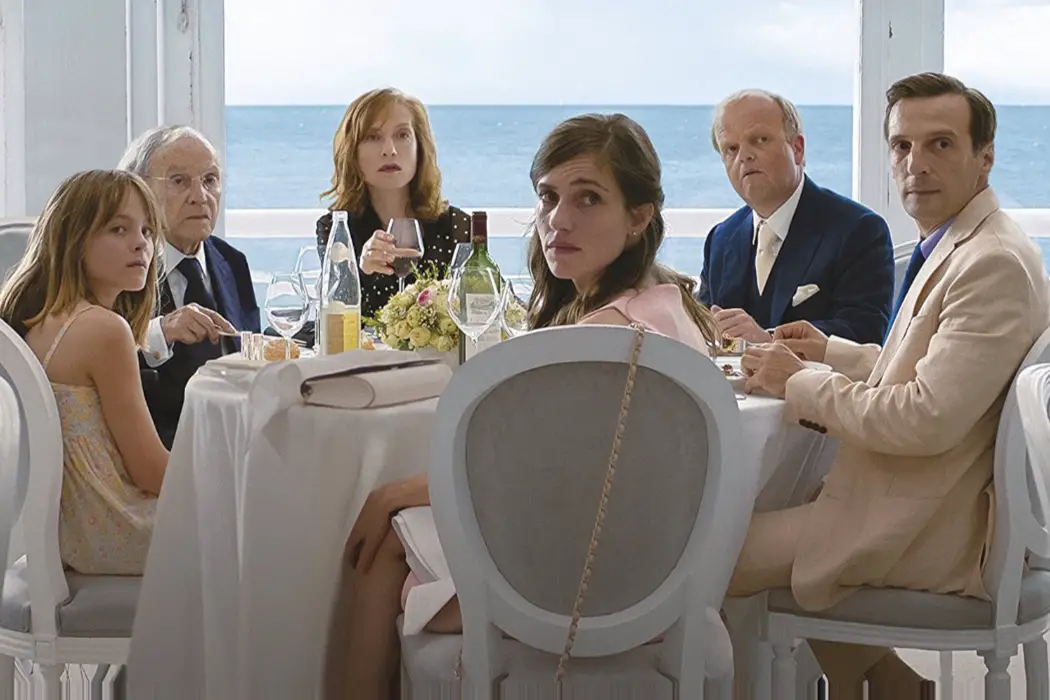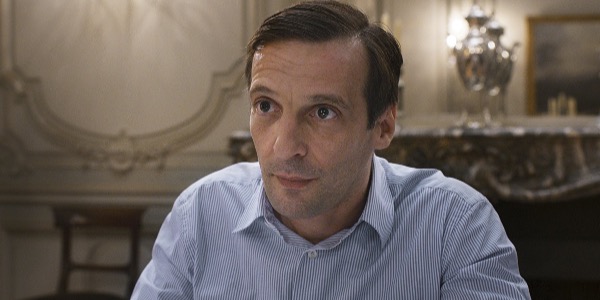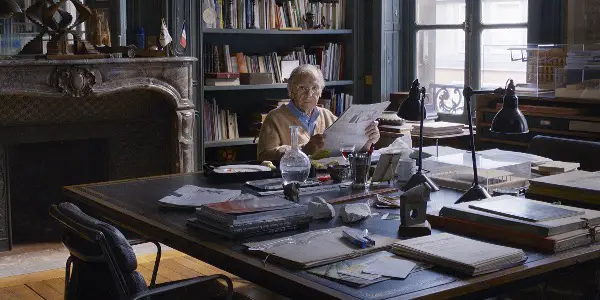HAPPY END: Michael Haneke Turns To Self Parody In This Underwhelming Family Drama

Alistair is a 25 year old writer based in Cambridge.…
Upon first glance, seeing that austere director Michael Haneke has named his new film Happy End signals that the title is a deliberately ironic joke housing a film devoid of any joy whatsoever. After all, there was nothing particularly hilarious about his Funny Games (unless, of course, you’re a psychopath), and although Amour was an earnest tale of love, it hardly lived up to the elegant romance its titled suggested.
Well, Happy End is the exception. Sure, it’s the same miserablism we’ve come to expect from the director – but unlike the aforementioned films in his back catalogue, it’s so poorly conceived, the film really lived up to its title by leaving me overjoyed when it finally, abruptly cut to the end credits.
Nothing happy to see here
The film documents the struggles of multiple generations of a well-off family, the Laurents, in Northern France – imagine a Haneke remake of The Royal Tenenbaums, and you’re halfway there. As closely guarded secrets of the different family members come to light throughout the film, I’ll keep this synopsis as vague as possible. As the film begins, 13 year old Eve (Fantine Harduin) poisons her mother with sedatives because of her “selfish” ways, and gets taken in by her estranged father Thomas (Mathieu Kassovitz), who is currently in the midst of a secretive sadomasochistic relationship with a woman other than his wife.
His sister Anne (Isabelle Huppert) owns a successful construction firm that’s fallen in to disarray due to the careless management of her alcoholic son Pierre (Franz Rogowski), while the family’s ageing patriarch Georges (Jean-Louis Trintignant) is wheelchair bound and turning increasingly suicidal due to his dementia. Happy Haneke everybody!

After the Oscar-winning success of Amour (which saw Haneke get nominated for Best Picture, Best Director and Best Original Screenplay, in addition to his Foreign Language award), Haneke spent the next few years trying to get an English language project, titled Flashmob, off the ground. As the years passed, the project fell through – and it feels like Happy End was quickly penned in order to give him something to direct after such an uncharacteristically long absence from behind the camera. The rambling screenplay doesn’t have the keen narrative focus he’s used to, with each individual storyline within the multi-generational character study feeling like a derivative of something that worked wonders in his earlier films.
We have the same commentary on disaffected young people detached from reality via the media as his 1992 film Benny’s Video – barely updated for the social media age, as the opening credits similarly include an animal death presented as blasé as the intro to his film from a quarter century earlier (before it was VCR and here, it’s presented on a Periscope-style app).
Other subplots include the same study of sexual degradation as 2001’s The Piano Teacher, the same dark-hearted look at the dying elderly as Amour and, most half baked of all, similar examinations of immigration as his 2000 film Code Unknown. The amount of previously explored themes and scenarios mined here leaves Happy End feeling less like a Haneke greatest hits than an insufferable case of diminishing returns.
Some critics have seen a darkly satirical view of immigration’s effects on France’s bourgeoise hidden within the film. I can’t help but feel that’s overreaching – the film may be set in Calais, home of the controversial “jungle” camp, yet this doesn’t infringe upon the narrative whatsoever. Only in a needless dinner party sequence later in the game does the plight of the refugees come into focus, yet instead of being self absorbed, the characters appear sympathetic to the cause.

This is a decision that’s utterly bizarre, especially following 95 minutes of watching disaffected characters mope their way through various depressing emotional traumas. It would be a greater commentary on the bourgeois reaction to the immigration crisis if they remained too self absorbed to offer these peripheral figures a literal seat at the table (yes, this visual metaphor really takes place) after receiving a very specific humiliation.
Rehashing old themes or falling victim to self parody?
The film juggles so many subplots, often forgetting them for significant stretches of time, that it leaves the end product feeling like it’s never really kicking into gear and getting started. All the stories are interconnected via the sheer nature of the character’s relationships, yet Haneke merges them together with the same assured nature as somebody forcing a jigsaw piece into a position that doesn’t fit.
The film is deathly boring due to the familiarity of their traumas, and the pseudo-soap opera dramatisation they are dealt with. But weirdly, the film’s running time never drags. The fact Haneke can’t transform all these interrelated issues into one coherent narrative makes the film feel like a series of extended, recurring vignettes – with the abrupt cut to credits somewhat shocking, due to how the film hasn’t even begun to scratch the surface of its characters, or thematic interests.
As well as his recurring themes being explored with an unintentional self-parody here (the film does feel like it was directed by the Michael Haneke parody twitter account, and not the man himself – the Piano Teacher-aping “sex talk” emails being the obvious accidental comic highlight), even his style feels oddly derivative of his more aesthetically assured earlier work. With the exception of a fantastic long take within the first ten minutes, which depicts the calamity at the construction site in a brilliant slow build, his visual obsessions of showing the world from the POV perspective of media consumers and lengthy takes elsewhere are unanimously laughable.

The elegance of this early long take is soon nowhere to be found; in the film’s most bizarre move, he spends a torturous amount of time watching a bad karaoke performance of Sia’s Chandelier, in which the performer proceeds to breakdance across the stage and scream bizarre ad-libs over the backing track. The take itself is probably two minutes at length, yet it plumbs new depths of awkwardness that left me feeling like it consumed the entire second act.
As for his POV shots from the perspective of social media users, opening the film via a Periscope style app is a clumsy artistic decision – beaten only by the aforementioned BDSM emails and instant messages which are typed out in real time, with about seven messages being sent at once, and is every bit as annoying as that sounds. These messages reach peak hilarity when Thomas’ lover professes to him that she will give him her “heart, her arse and her soul”.
Despite working with the same high calibre of actors as always, Happy End doesn’t even feature standout performances. Even the usually radiant presence of Isabelle Huppert fails to light up this utterly inert film – although that Haneke can make one of the best actresses alive, who he has previously directed to career-best performances, boring is something of an achievement.
Conclusion: Happy End
Overall, Happy End is a disappointing new effort from Michael Haneke, that strays too far towards self parody to ever be taken seriously. Although its been five years since Amour and the wait for a new effort has been painful in the years since, the final product is so underwhelming, it’s left me wishing the great director would have gone back to the drawing board to cook up a more original tale of misery and despair. It would certainly be preferable to this utterly underwhelming attempt to once again explore his narrative obsessions.
What are the worst films by great directors?
Happy End is released in the UK on December 1st, before receiving a limited US release on December 22nd. All international release dates are here.
Does content like this matter to you?
Become a Member and support film journalism. Unlock access to all of Film Inquiry`s great articles. Join a community of like-minded readers who are passionate about cinema - get access to our private members Network, give back to independent filmmakers, and more.
Alistair is a 25 year old writer based in Cambridge. He has been writing about film since the start of 2014, and in addition to Film Inquiry, regularly contributes to Gay Essential and The Digital Fix, with additional bylines in Film Stories, the BFI and Vague Visages. Because of his work for Film Inquiry, he is a recognised member of GALECA, the Gay & Lesbian Entertainment Critics' Association.













